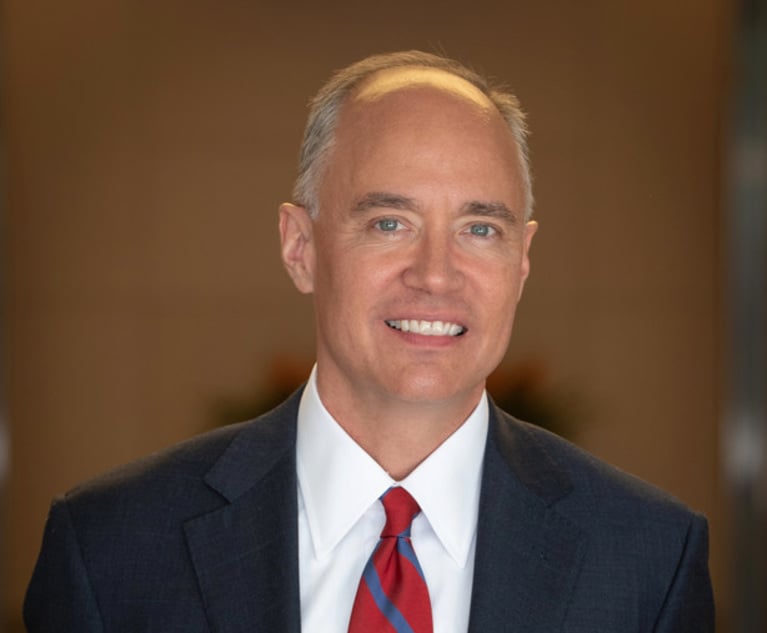Jay Edelson Rejects Objector Lawyer's Offer to Stop Practicing Law
The opposed motion goes before U.S. District Judge Rebecca Pallmeyer at a hearing on Thursday in Chicago.
September 19, 2018 at 07:30 PM
5 minute read
 Christopher Bandas, managing partner with Bandas Law Firm.
Christopher Bandas, managing partner with Bandas Law Firm.
Jay Edelson's lawsuit against three serial objector lawyers in class actions took an unusual turn after the primary defendant, Christopher Bandas, offered to end the case last month with a judgment against himself—and Edelson rejected it.
The class action bar is closely watching the case because it addresses the controversial issue of “objector blackmail,” which is when objector lawyers extort payments to drop their appeals challenging class action settlements. In fact, an upcoming amendment to the federal class action rules requires court approval of such payments, currently done in secret.
Edelson, of Chicago's Edelson PC, sued to stop the actions of Bandas, of the Corpus Christi Bandas Law Firm, as well as two other objector lawyers and their law firms. Earlier this year, a federal judge in Chicago tossed most of the claims, including those under the U.S. Racketeer Influenced and Corrupt Organizations Act.
Last month, Bandas offered to end the case by agreeing that he engaged in the “unauthorized practice of law in Illinois,” where he is not licensed. But Edelson rejected the offer, prompting Bandas to file a motion for judgment earlier this month. Edelson has opposed that motion, which goes before U.S. District Judge Rebecca Pallmeyer of the Northern District of Illinois at a hearing on Thursday in Chicago.
In an opposition, filed on Sept. 12, an Edelson lawyer wrote that “the judgment Bandas requests does not provide full relief because it would allow him to carry on largely—if not entirely—as before.”
“Even if the description of the injunction in the complaint were all of the relief Edelson could obtain (which is not the case), Bandas' proposal doesn't even give Edelson that,” wrote associate Alex Tievsky.
Edelson referred a request for comment to Ryan Andrews, another partner at his firm, who declined to comment. Bandas and his lawyer in the case, Darren VanPuymbrouck of Freeborn & Peters in Chicago, did not respond to requests for comment.
Edelson's suit, filed in 2016, named Bandas, Christopher Bandas and two other lawyers—Jeffrey Thut of Noonan Perillo & Thut Ltd. and solo practitioner Darrell Palmer—who allegedly helped Bandas.
Much of the debate centers on what's left in the case. Bandas claims the only remaining claim is for unauthorized practice of law under the Illinois Attorney Act. His offer promised he would stop practicing in Illinois, but he refused to pay Edelson's attorney fees in the case.
Edelson, in his opposition, argued that he can still pursue an injunction under the All Writs Act, such as one declaring Bandas a vexatious litigant. He also argued that the judgment isn't specific enough.
“His proposed injunction is so vague that it effectively prohibits nothing,” Tievsky wrote. “His motion should be denied.”
The motion for judgment also has no case citations but is akin to the “unaccepted settlement offer” at issue in the U.S. Supreme Court's 2016 ruling in Campbell-Ewald v. Gomez. That ruling found that such an offer, made to “pick off” a lead plaintiff in a class action, did not moot the entire case.
“While Bandas has made a career of manipulating the rules of civil procedure to force plaintiffs' class action firms to accede to settlements that benefit only him, binding authority forecloses his ability to do so here,” Tievsky wrote.
In addition, Edelson issued a subpoena last month for the Bandas Law Firm's bank records. The subpoena seeks all bank records since 2008 relating to transactions involving fees Bandas got in cases in Illinois. It has a list of 108 lawyers, law firms and other companies, including San Francisco's Lieff Cabraser Heimann & Bernstein and Seeger Weiss in New York.
Both Bandas and First Community Bank in Corpus Christi have filed motions to quash the subpoena. Bandas called the subpoena “improper and flawed” and “overly broad.” His lawyer, Eric Stewart of Huseman & Stewart in Corpus Christi, wrote that it was “part of a continued attempt to pry into confidential financial matters” of his firm.
James McKibben, a lawyer for First Community Bank, wrote that the subpoena was “vague and ambiguous” and an “extreme hardship” for his client. The request also violated the privacy provision of the Gramm-Leach-Bliley Act.
Neither Stewart nor McKibben, of McKibben, Martinez, Jarvis & Wood in Corpus Christi, responded to requests for comment.
Last week, Edelson opposed the motions, filed in federal court in Corpus Christi. In that opposition, Tievsky, Edelson's attorney, claims the transactions are “highly relevant evidence showing that Bandas rendered legal services without authorization.”
“The main goal of this subpoena is to uncover evidence of the attorneys' fees that Bandas has received in exchange for dropping his vexatious objections,” he wrote. “Proof that Bandas accepted money for himself to settle an objection—as well as proof of the amount of that money—helps Edelson illustrate the scope of the problem Bandas causes and the need for an equitable remedy to stop his abuse of the courts.”
This content has been archived. It is available through our partners, LexisNexis® and Bloomberg Law.
To view this content, please continue to their sites.
Not a Lexis Subscriber?
Subscribe Now
Not a Bloomberg Law Subscriber?
Subscribe Now
NOT FOR REPRINT
© 2025 ALM Global, LLC, All Rights Reserved. Request academic re-use from www.copyright.com. All other uses, submit a request to [email protected]. For more information visit Asset & Logo Licensing.
You Might Like
View All
Read the Document: DOJ Releases Ex-Special Counsel's Report Explaining Trump Prosecutions
3 minute read
Special Counsel Jack Smith Prepares Final Report as Trump Opposes Its Release
4 minute read
Patent Disputes Over SharkNinja, Dyson Products Nearing Resolution

Revisiting the Boundaries Between Proper and Improper Argument: 10 Years Later
8 minute readTrending Stories
- 1Vedder Price Shareholder Javier Lopez Appointed to Miami Planning, Zoning & Appeals Board
- 2Wells Fargo and Bank of America Agree to Pay Combined $60 Million to Settle SEC Probe
- 3Legaltech Rundown: Robin AI Releases In-house Tool, Epona Merges With JustiSolutions, and More
- 4As Lawmakers Eye Need for NY Supreme Court Posts, Could a Ballot Question Remove the Constitutional Limit?
- 5State Appellate Court Rejects Reasoning for Attorney's Removal From Conservatorship
Who Got The Work
J. Brugh Lower of Gibbons has entered an appearance for industrial equipment supplier Devco Corporation in a pending trademark infringement lawsuit. The suit, accusing the defendant of selling knock-off Graco products, was filed Dec. 18 in New Jersey District Court by Rivkin Radler on behalf of Graco Inc. and Graco Minnesota. The case, assigned to U.S. District Judge Zahid N. Quraishi, is 3:24-cv-11294, Graco Inc. et al v. Devco Corporation.
Who Got The Work
Rebecca Maller-Stein and Kent A. Yalowitz of Arnold & Porter Kaye Scholer have entered their appearances for Hanaco Venture Capital and its executives, Lior Prosor and David Frankel, in a pending securities lawsuit. The action, filed on Dec. 24 in New York Southern District Court by Zell, Aron & Co. on behalf of Goldeneye Advisors, accuses the defendants of negligently and fraudulently managing the plaintiff's $1 million investment. The case, assigned to U.S. District Judge Vernon S. Broderick, is 1:24-cv-09918, Goldeneye Advisors, LLC v. Hanaco Venture Capital, Ltd. et al.
Who Got The Work
Attorneys from A&O Shearman has stepped in as defense counsel for Toronto-Dominion Bank and other defendants in a pending securities class action. The suit, filed Dec. 11 in New York Southern District Court by Bleichmar Fonti & Auld, accuses the defendants of concealing the bank's 'pervasive' deficiencies in regards to its compliance with the Bank Secrecy Act and the quality of its anti-money laundering controls. The case, assigned to U.S. District Judge Arun Subramanian, is 1:24-cv-09445, Gonzalez v. The Toronto-Dominion Bank et al.
Who Got The Work
Crown Castle International, a Pennsylvania company providing shared communications infrastructure, has turned to Luke D. Wolf of Gordon Rees Scully Mansukhani to fend off a pending breach-of-contract lawsuit. The court action, filed Nov. 25 in Michigan Eastern District Court by Hooper Hathaway PC on behalf of The Town Residences LLC, accuses Crown Castle of failing to transfer approximately $30,000 in utility payments from T-Mobile in breach of a roof-top lease and assignment agreement. The case, assigned to U.S. District Judge Susan K. Declercq, is 2:24-cv-13131, The Town Residences LLC v. T-Mobile US, Inc. et al.
Who Got The Work
Wilfred P. Coronato and Daniel M. Schwartz of McCarter & English have stepped in as defense counsel to Electrolux Home Products Inc. in a pending product liability lawsuit. The court action, filed Nov. 26 in New York Eastern District Court by Poulos Lopiccolo PC and Nagel Rice LLP on behalf of David Stern, alleges that the defendant's refrigerators’ drawers and shelving repeatedly break and fall apart within months after purchase. The case, assigned to U.S. District Judge Joan M. Azrack, is 2:24-cv-08204, Stern v. Electrolux Home Products, Inc.
Featured Firms
Law Offices of Gary Martin Hays & Associates, P.C.
(470) 294-1674
Law Offices of Mark E. Salomone
(857) 444-6468
Smith & Hassler
(713) 739-1250






